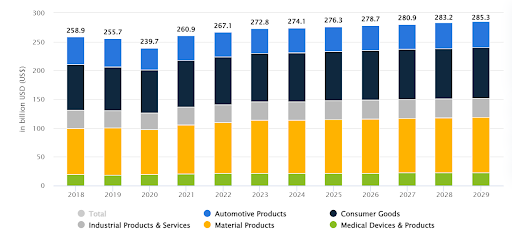
Main Business Industries in France
France has the second-biggest economy in the European Union, which is supported by several major industries. The dominant sectors in terms of employment are health and social care, wholesale and retail trade, and manufacturing (according to CEDEFOP). The digitalisation of many industries in France means that both in-person and online business ventures within these industries have a great chance to succeed.
Services
The tertiary sector produces more than two thirds of French GDP. Tourism, retail, and financial services are among the most significant industries within this sector.
Tourism
France welcomes more tourists than any other country in the world. Tourism represents 8.8% of France’s economic output and contributed €246bn to France’s economy in 2023.
Almost 3 million people are employed within the tourism sector. This is 4.9% more than in 2019, indicating a fast-growing industry that offers numerous opportunities. Charles de Gaulle airport handled 67.4 million visitors in 2023. This was a 17% increase compared to the previous year.
France’s first-rate gastronomic offering, vast natural beauty, and fascinating history offers entrepreneurs scope to develop tourism-based businesses that extend far beyond Paris. Consider offering adventure tours in the Pyrenees, surf camps, or tours of France’s rural chateaux and vineyards to take advantage of the upward tourism trend.
Online Retail
E-commerce is a thriving industry in France. In 2022, 42 million French residents (80.4% of all French internet users) shopped online. It’s estimated that the average French consumer shopped online around 54 times a year, spending a total of €3,500. Clothing, tourism, shoes, and beauty products were the most popular products purchased online in France.
International E-Commerce
In 2022, 62% of online merchants established in France received orders from foreign customers (see previous link). When starting an e-commerce business in France, it’s vital to take both domestic and international customers into account.
Set up a merchant services account with an integrated global payment gateway when building a French e-commerce website. Your payment gateway should allow you to accept payments in different currencies if your customers order from outside the eurozone area.
Financial Sector
Traditional financial institutions are a vital part of France’s economy. France has one of the most significant banking sectors in Western Europe. This includes 334 operating banks (as of 2022) that provide traditional banking services and are leading the way in investment and innovation in Fintech.
Manufacturing
According to World Bank data, industry (including construction) made up 18.7% of France’s GDP in 2023. The value that manufacturing adds to the French economy is estimated to reach US$274.1bn in 2024.
Key industries within the French manufacturing sector include automobiles, consumer goods, and medical devices or products. The French manufacturing sector has experienced—and is projected to experience—stability without notable growth:

Vehicle Manufacturing
The French aerospace and automotive industries are significant. As just one example, the French company Airbus places €16.9 billion in orders annually with 3,400 suppliers in France and employs around 53,000 workers around the country. Airbus exports more than €30 billion in aeronautical or space-related products per year.
The French car industry is also world-renowned. France is home to Peugeot, Renault, and Citröen. However, the petrol car industry is taking a downturn, with an almost 32% decline in sales of petrol and diesel cars reported for France in September 2024. Entrepreneurs in the automotive sector should consider focusing on electric and hybrid vehicles as these are coming to occupy a greater market share in France and also in Europe as a whole.
Luxury Goods Manufacturing
France is a haven for manufacturers of luxury goods. From fashion powerhouses like Chanel and Louis Vuitton to Hermes and Cartier, France is synonymous with chic, high-ticket items. A modest rise in sales is projected for luxury fashion items, jewellery, and perfume and cosmetics from 2024-2029.
France could be the perfect place to sell luxury products online as the customer base is already well accustomed to high-quality, unique products.
Chemicals, Pharmaceuticals, and Medical Manufacturing
The chemicals industry is key to the French economy. Chemical production in France had a turnover of €108.5bn in 2023, produced by over 4,000 companies. The chemical industry is France’s most significant industrial sector, with €80 billion in exports. Chemical production is estimated to employ 177,000 people directly in France plus another 885,000 indirect jobs.
The pharmaceuticals market is also thriving. The industry is projected to experience compound annual growth of 3.99% between 2024 and 2029. This will lead to a market volume of US$33.20bn by 2029. The largest market within the pharmaceuticals industry is oncology drugs, with a market volume of US$4.76bn in 2024.
Green Manufacturing
France’s aim to achieve a net-zero economy has opened the door for investment in green industries. This is supported by the EU, which has approved a €2.9 billion scheme to develop green industries in France. Companies planning investments in renewable energy production like solar panels or wind turbines, or the components required to produce them, can apply for tax credits to support their business.
France’s focus on sustainable solutions span various industries ranging from agriculture to energy production. France is Europe’s third biggest producer of renewable energy and is consistently one of the top electricity exporters in the world.
Agriculture
French agriculture is responsible for some of the most iconic products in the world. The 456,000 farms in France are diverse and produce everything from cheese to wine. Agricultural production in France is one of the highest in the European Union, with a value of €72.9 billion annually. The most lucrative product is wine, which accounts for 13.2% of production value in France. This is followed by milk (13.2%), cereals (13%), and cattle (9.9%).
France has its own strategy to implement the EU’s common agricultural policy (CAP) and make agriculture a fairer industry to work in. The French provisions include improving farmers’ income and competitiveness, increasing product quality, and protecting region-based intellectual property rights with geographical indication stamps on agricultural products. Businesses within the agricultural sector also receive subsidies from the French government and the EU.
The French Economy at a Glance
The following World Bank data about the French economy and economic growth in France provides a snapshot for people looking to start a business in the country:
- Unemployment rate: 7.3% of the labour force (2023)
- GDP: $3.03 trillion (2023)
- GDP growth (annual %): 0.7
- Economic activity by sector (2023):
- Primary sector: 1.9%
- Secondary sector: 18.7%
- Tertiary sector: 69.2%
- Economic freedom level: France is only considered “moderately free” when it comes to economic freedom.
Entrepreneurs will find a social and political environment that supports a wide range of businesses. Government spending on green initiatives are particularly popular. Eco-friendly manufacturing businesses, luxury goods, and businesses within the services sector have a good chance of being successful in France.
Join France’s Major Industries
France has several major industries that present opportunities for interested entrepreneurs. The services, manufacturing, and agricultural sectors are especially notable and display a unique mix of tradition and global outlook that will appeal to entrepreneurs from around the world.
Knowledge of the French market and having the tools in place to drive sales are key factors to seeing your business take off. Savvy entrepreneurs who can spot a gap in the market will be well positioned to see their French enterprise succeed.

